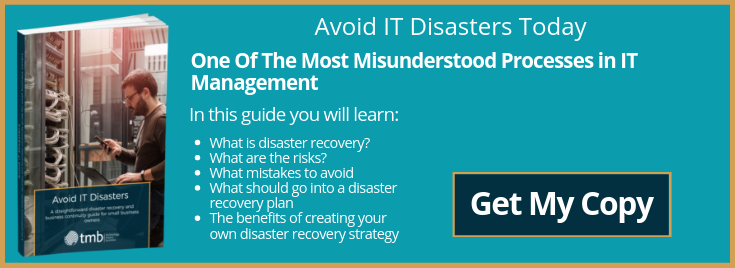Disaster Recovery: What Is It, And Does Your Business Need It?
- Anthony
- November 6, 2018
- 10:00 AM
- No Comments
Backing up is critical, but so is recovery.
If the arrival of GDPR hasn’t driven the message home already, let us remind you: data matters. All businesses rely on data in numerous ways, and it has real value, including financial value. Yet many organisations don’t have a proper backup and disaster recovery (DR) strategy in place. In fact, a lot of business owners don’t even know what the difference is between the two.

Any responsible company will know the importance of backups. So much of modern business relies on digital files, such as invoices, contracts and reports, that data loss should be considered a major threat to any organisation’s survival. To mitigate the impact of such an incident, many firms back up their important data to a second location, such as a USB drive, a network-attached storage device or even the cloud. Particularly conscientious folk will back up to multiple destinations, perhaps using a 3-2-1 strategy for extra peace of mind.
Backup Vs Disaster Recovery
Although restoring your data from a backup could potentially get you out of a sticky situation, it isn’t the same thing as disaster recovery. With disaster recovery, businesses’ entire networks can be cloned in real time to an offsite location, and if anything goes wrong with the main network, that remote copy can be spun up in virtual machines, allowing work to continue with minimum interruption.
In contrast, backups are taken periodically, at set times. The backups are then stored for as long as the relevant policies and contracts define.

Backup & Disaster Recovery: The Perfect Team
Backups are critical to any meaningful recovery plan, but their usefulness is limited in certain situations. For example, backups made to an on-site server, while a good idea, shouldn’t be relied on as a sole form of data insurance. In the case of fire, theft or natural disaster, anything that destroys the original data would likely wipe out the backups too.
Having online, cloud backups gets around this problem, of course, which is why it’s such a good idea to use this as a secondary solution.
But whether you back up to local destinations, online or both, you also need to think carefully about the recovery process. How long would it take download all your files and put them back where they belong? And how long are backups being kept for? Possibly not as long as you think.
This where disaster recovery comes into play. Instead of simply making copies of important files, which then have to be put back where they belong, disaster recovery is all about business continuity – allowing people and systems to work and transact when IT solutions are playing up.
Let’s say your business’s main server is hit by a ransomware attack. All your data has been encrypted, you can’t access emails, orders can’t be processed, payroll is frozen… and so on. With a disaster recovery solution, you would be able to quickly continue working from a cloned version of your network, running from an on-site backup server. And if there are problems with that, you can failover to a cloud-based backup. This is how it works with TMB's own fully managed BDR solution.
Why Disaster Recovery Matters
We’ve written many times about the value of data to businesses and the possible consequences of losing it, including fines and reputational damage. But often the real killer for businesses is downtime. If operations are halted, you’re losing time and money, while your competitors will continue as normal.
Without an effective disaster recovery strategy in place, backups are still worthwhile, but companies should be sure they can afford to wait for files to be restored.
Where possible, if signing up to a disaster recovery service, it also makes sense to take up 24x7 support. If you don’t, you’ll likely find it hard to get help at the weekends and in the evenings, which will inevitably lead to unnecessary disruption.
Want to know more about TMB's disaster recovery and backup options? Contact us to arrange an obligation-free chat about your requirements.

